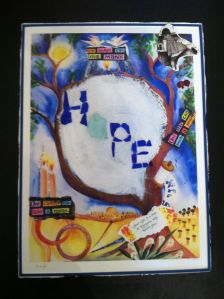On Oct. 15 2011, my husband left me.
I don’t mean left me as in, we talked about separation, we divided up our things and he departed the house — you know, with agreement. With finality. With closure. With conversation. I mean, he left me as in I returned home one evening to find he had packed up all he could fit into the car, cleared out the bank accounts, and left the keys behind, with nary a word or a note –and never to communicate again via phone, text or email (at least, not until seven months later when he wanted to get the rest of his things).
To be fair, we HAD talked separation. After nearly a year of marriage counseling, and another few previous years of strife and struggle, I had finally come to the realization that the marriage was never going to be truly that — a marriage, a joint union, each spouse standing for the other, making decisions for the marriage in lieu of the self. The morning he left, we had talked a bit more about the logistics of a separation, what the process might be.
But his actions that day had me feeling just one thing: ABANDONED.
Abandonment was my worst fear, realized.
It was the stuff of all my nightmares as a child, a teen, and even an adult. It’s what I had fought to avoid — in all my relationships, in my jobs, in my every day. By 4 am the next morning I was exhausted, unable to sleep and devoid of any feeling except a deep pit in my stomach that was unquenchable with the very blackness of its depth. I couldn’t cry. I couldn’t sleep. I couldn’t even think.
I was an empty vessel lying in bed that night and morning. I didn’t know until then how much of my soul had gone into keeping the very thing I feared the most — abandonment — at bay.
When I called my Mom the morning after that sleepless night, all the feelings I’d been holding back, the ones locked behind the empty vessel I had become over the past three years, came flooding out in one single clarified moment. For the first time in many, many years, I sobbed, and I did it from the depths of my fear. All the loneliness, pointless wishing and hiding from myself I’d been doing came crashing in at once and came out of me in a low empty, nearly voiceless cry turning into a deep racking sob that lasted for wordless, endless moments.
It’s amazing what can happen when there’s nothing left to lose. For the first time in my life, I asked my Mon to come and rescue me: to come and stay with me the next week as I navigated not just sudden aloneness, but with the sudden grappling of the knowledge I’d been trying to avoid for so long, maybe since just after I’d gotten married. Not only was I abandoned NOW, I’d been abandoned, really, from the very beginning. Maybe before I’d even fathomed the idea of marriage at all.
She came to rescue me, to stay with me, just to BE with me. And my restart started, again.
*******************
Abandoned, or at rest, a boat unsailed will start to rot.
Each year, hundreds of ships are abandoned at docks and on sea. Depending on how you define abandonment, the actual number could be MUCH higher. After all, while we often talk about ships as though they embody a human — usually a she, as in, “She sails straight,” or “She is a great, beautiful boat,” or “She has her quirks but she never lets me down in weather,” — sailors and shipmen alike tend to refer to how much “soul” a boat has. Some storied ships carry their own spirit, regardless of owner, but these are few and far between. I would argue that most ships only have as much soul as its captain and crew are willing to put into it.
Amazingly, even though many of these abandoned ships sit at docks or anchor for years, no one steps in to claim them as their own. There is an unwritten rule that, even if a ship’s owner has not taken care of a ship in years, has not visited her or paid for her dockage or done anything to upkeep the ship, She belongs to someone else.
Plenty of laws exist on the books in each local, state and international jurisdiction that make it clear that even if it’s abandoned, it still belongs to someone. Marinas have to go through piles of paperwork to get an abandoned boat declared as such before they can legally be allowed to remove it. The US Coast Guard and state natural resource departments can’t even begin to clean up the waste of an unclaimed boat until they get a legal declaration — a process that again takes much time and paperwork. Even if they do, there remains the ultimate question of who will pay for the removal of not just the boat but the fuel and oil it leeches into the water as it decays. Because ultimately, these abandoned ships eventually succumb to the water in which they languish.
A boat without water flowing by its hulls will eventually begin to rot, from the outside in. Wooden boats’ planks begin to shrink, change shape and leak water until the boards open to let more water in while the batteries die and the pumps stop emptying the ship of the inevitable water that makes its way through (because, as any seasoned sailor will tell you, all wooden boats leak, all the time). Metal hulls start to rust and welded seams eventually fail. Fiberglass hulls, too, develop weaknesses when left to the wiles of winds, waves and rain.
To prosper and survive, ships need sailed. As though there is a deep-seated recognition that an abandoned ship is soulless and without much merit, the REAL pirates of today — the ones that patrol Africa’s coast and the China seas and even parts of the Caribbean — will not touch an abandoned boat. They target vessels already under steam, with a crew, a commodity underway. These pirates know a boat abandoned is merely an empty vessel, and they want a vessel full of possibility they can steal.
***********************
In the months after my spouse abandoned me, an amazing and unexpected thing happened: I found faith. In the vastness of love foundered on dreams unrealized, I developed a deep, abiding belief in love. I found a lasting sense of peace. And I discovered I had never been abandoned at all. In this abandonment, I found freedom to take the abandoned vessel I thought I had become, shore it up with some new boards, a bit of pitch tar and faith in a right wind and TRUST it fully again. I learned to trust myself again, and I learned to trust the sense that came from deep within that there was something else driving this ship, something that I could trust.
We all have this opportunity, all the time, in the small and big losses of life.
Losing a job, an important relationship, a loved one, a dream: In our human attempts to overcome the inevitability of life, the ebb and flow of dreams developed, followed and derailed, we try to keep those events that cause those feelings at bay because, ultimately, we like to think that we can control what happens to us.
We gather inspirational sayings to arm ourselves against that nagging voice that tells us in the quiet moments on dark nights that we are not good enough, not important enough or not doing enough. These work, for a time, until that next quiet moment returns. These losses force us to look directly at the one thing we fight against as humans: that We Can Not, try as we might, BE God.
We do not consider, maybe we cannot consider, that in the clearing that loss creates, we are not DEVOID as much as we are an empty vessel ready to be filled. Perhaps then, the ultimate question is what we will fill our vessels with, what soul cry we will answer when we are finally empty enough to choose freely.
And so maybe boats – and people- ultimately become a product of their story and founding principles no matter where they sit or sail.
Left with nothing to lose, our vessels ask us what soul cry we will pick up. Our fate is not sealed: we are not an empty ship abandoned and now devoid of soul without its captain and crew to give it story and heart. Our vessel was never empty to begin with. And instead of fearing the space that these great losses can bring, we can instead remember that our soul infuses within us a continuing story. Abandonment is a chance for us to ask, instead of what the world will bring to us, what WE will bring to the world.




Laura, your story reminds me so much of what happened in my own life 23 years ago when my husband did much the same thing the day before I returned home from Boston. I don’t know that I’ve found the peace that you have, but I do know I’ve become a strong, fiercely independent woman that my children are proud of and respect. Thanks for sharing this intimate piece of your life and how it has helped make you who you are today. We must all remember that no matter what turmoil life hands us, it can be a lesson. We just have to listen.
LikeLiked by 1 person
Linda, thank YOU for sharing. I think it was easier for me since I had already decided on a separation- the only thing I had to process through was the abandonment itself, not so much the loss of the marriage since I had already tackled that. Each situation is different, indeed, but isn’t this shared story of ours proof that we are not in anything alone, entirely, not really? 😉 Thanks for reading.
LikeLike